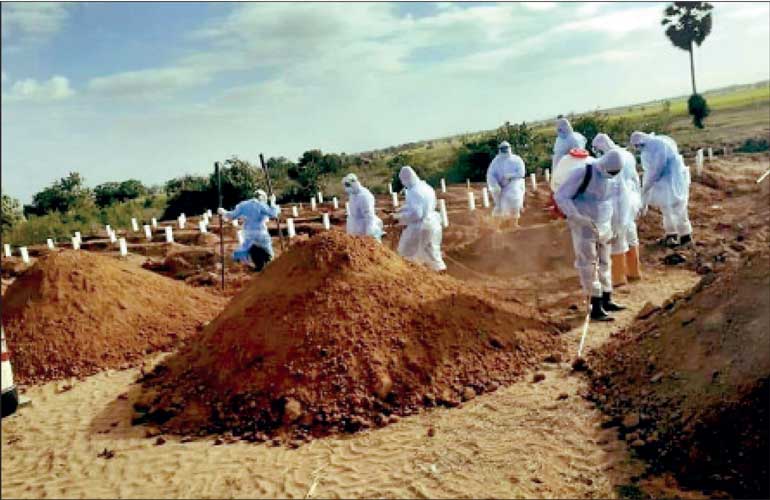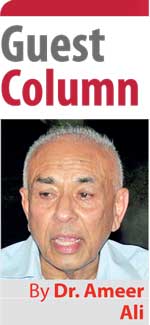Thursday Feb 19, 2026
Thursday Feb 19, 2026
Saturday, 4 September 2021 00:10 - - {{hitsCtrl.values.hits}}

The fateful decision made by GR to cremate COVID-dead bodies was on the basis of a spurious argument that burying the COVID-dead would contaminate ground water. Later, without dismissing the water contamination argument, the rulers decided to transport the human corpse to be buried in far-off places and dry lands. What actually lies behind this costly exercise is politics and not the prevention of pandemic
 It would be difficult to find a better instance of proof to demonstrate how economically irrational, administratively incompetent and politically vengeful the Rajapaksa rulers are than their decision to transport under strict security protection thousands of COVID-dead bodies from all parts of the island to an otherwise sleepy Muslim town of Oddamavadi in Eastern Province, whose Majma Nagar, a few acres of precious grazing land for cattle owners, has now become a mega-cemetery.
It would be difficult to find a better instance of proof to demonstrate how economically irrational, administratively incompetent and politically vengeful the Rajapaksa rulers are than their decision to transport under strict security protection thousands of COVID-dead bodies from all parts of the island to an otherwise sleepy Muslim town of Oddamavadi in Eastern Province, whose Majma Nagar, a few acres of precious grazing land for cattle owners, has now become a mega-cemetery.
So far, Majma Nagar is said to have consumed around 2,300 COVID-dead bodies of which 2,150 are Muslims. At a time when the pandemic has caused incalculable damage to the economy and driving the treasury to the brink of bankruptcy, how could one justify the waste of precious financial resources and limited administrative capacity and personnel in a political experiment just to satisfy the cravings of vengeful Islamophobes?
When the first case of the pandemic appeared in 27 January 2020 (interestingly the victim was a Chinese non-national) before infecting several by April that year, which warranted immediate provision of quarantine facilities, it was just a little over two months since Gotabaya Rajapaksa (GR) was elected as President. Following his election, in August 2020, Parliamentary Elections were held and the President’s brother Mahinda Rajapaksa (MR) became Prime Minister.
In both elections it was the Sinhala Buddhist communal card more than any other issue that determined the final outcome. It was the campaign against an assumed threat from minorities and particularly from Muslims after the Easter attacks that won the battle.
Muslims of course overwhelmingly rejected the winners at both elections. The scar from that wound was still afresh in the minds of the rulers when COVID broke out. Was it any wonder then that when the pandemic started spreading some Tablighi Jamaat returnees from India were blamed by a few Buddhist zealots?
By that time however, Muslim community had suffered immensely at the hands of Buddhist supremacists, and neither GR nor the Government of MR did anything to check the anti-Muslim rage. It was in that background the fateful decision was made by GR to cremate COVID-dead bodies on the basis of a spurious argument that burying the COVID-dead would contaminate ground water and would be a source for the spread of COVID.
That argument came originally from a Professor of Soil Science and not of epidemiology from the University of Sri Jayewardenepura. Neither the WHO nor any epidemiologist anywhere in the world supported her findings. It was universally considered safe to bury the pandemic dead without any chance of the living getting infected from underground water.
But in a country where myth and occultism are accepted as part of scientific knowledge that professor’s pseudo-epidemiology was grasped by hardliner Buddhist monks, their political bigwigs and Viyathmaga cabal to wreck vengeance on Muslims. A President who was brought to power by this mob had no choice but to succumb to their demand.
There was one monk who publicly proclaimed that burying the COVID-dead would bury the Government. Muslim COVID-dead were therefore forcibly cremated, provoking protests not only from Muslims inside and outside the country, but also from Christian priests, enlightened Buddhist monks, intellectuals and international human rights groups.
Forced cremation went on until UNHCR took up the issue and which was one of the reasons why the country faced that debacle in Geneva in September 2020. After that, the regime was looking for a way out of the dilemma without losing the support of its political base.
Any government or ruler who believes in and respects the findings of proven science and intellectual rationalism would have discarded the soil scientist’s argument and allowed burials in whichever cemetery available closer to the family of the dead. It would have been cheaper, less time consuming, humane and would have shifted the responsibility of burying the dead to the victim’s family and friends. Of course, precautionary measures are necessary and restrictions should be imposed on the number allowed to attend the funeral and take care of the religious or cultural final rites. Every other country has adopted this policy.
Here, the regime does not want to reject the original rationale even though its originator had resigned from the advisory group. This is typical of a government that has marginalised the advice and role of health experts and qualified epidemiologists in policy making, and has put its trust instead on the military and medical trade unions.
Without dismissing the water contamination argument, the rulers searched for an alternative strategy. They decided to transport the human corpse to be buried in far-off places and dry lands. Having considered a Maldivian solution at first to export the dead to that country, but sensibly rejected later because of possible diplomatic nightmares in future, Iranaitivu in the Gulf of Mannar was chosen as an alternative. When people of that island rose in revolt, it was also given up and a final decision was made to transport the dead to be buried in Majma Nagar in Oddamavadi.
None of the Muslim parliamentarians raised even an eyebrow in protest. While they were illegitimately claiming credit for the regime’s abdication of forced cremation, the regime was looking for a distant spot to dump all COVID dead Muslim bodies to satisfy the hardliner monks and Islamophobes. This decision has now proved to be a very costly exercise. Will the Finance Ministry publish the data on the cost of burials in Oddamavadi?
As Majma Nagar is getting filled and Oddamavadi Town Council is crying for help, there is talk of opening a new cemetery either in Irakkamam or possibly Puttalam, two other Muslim enclaves. In the prevailing financial tightness of the Government, this exercise is irrational, unaffordable and even unjust. What actually lies behind this costly exercise is politics and not the prevention of pandemic.
(The writer is attached to the School of Business & Governance, Murdoch University, Western Australia.)